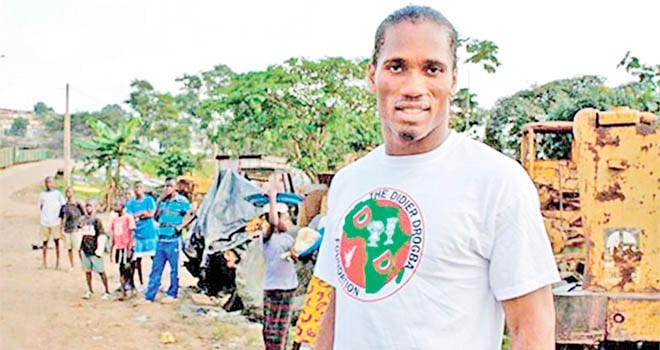

Football fans in Pakistan are not only well aware of great football players like Messi, Ronaldo, Rooney, Xavi and Zidane but in the absence of quality football players and professional clubs in the country, they also associate themselves with renowned international football clubs and athletes. These football heroes mostly hail from Europe and Latin America. Few footballers from Africa or Asia are popular with Pakistani football fans.
Didier Drogba, born in March 1978 in Abidjan, Ivory Coast, was not only an outstanding football player from the African continent but also an exceptional athlete with the ability to use the value of sport to achieve higher purposes in life such as peace -- both in his country and abroad.
Drogba started his professional football career at age 21 as a striker with Le Mans Union in France. He arrived at Olympic Marseille in 2003. By then he had become one of the best European attackers.
In 2004, Drogba was transferred to Chelsea for a record 24 million pounds. His football career took a new dimension as he won the FA Premier League in 2004-5, 2005-06 and 2009-10 and the UEFA Champions League in 2011-12.
Drogba also helped Ivory Coast qualify for their first World Cup appearance in Germany in 2006, and captained his team to the second place in the 2006 Africa Cup of Nations.
He was declared the African Footballer of the Year in 2006 and 2009. He remains the top scorer of Ivory Coast.
Once acclaimed as a model of political stability and prosperity, Ivory Coast was split into two fractions in 2002. The Muslim-dominated area in the north was controlled by an armed group known as the "New Forces". The mainly Christian south was ruled by the government of Laurent Gbagbo. Hoping to contribute to a peaceful resolution of animosities, Drogba made a public appearance and pleaded with combatants from both sides to lay down their arms, following Ivory Coast’s qualification for the 2006 World Cup.
In 2007 with the occasion of a qualifying game for the 2008 African Cup of Nations against Madagascar, Drogba helped organise a match in the then rebel stronghold of Bouake. The opening lines of a report about this momentous occasion sums up the success of this great initiative: "A single match of football achieves what five years of combat and negotiations could not: an apparent end to Ivory Coast’s civil war." These lines are also of great importance for us as a nation which is involved in an unending fourth-generation, low-intensity but high-impact war against terrorists in the entire country.
The point to emphasise here is that the man who brought the warring sides together was not a politician or a gun-toting strongman, nor was he a columnist liked by the government officials but Didier Drogba, the star striker for Ivory Coast where football is worshiped like cricket in our part of world.
The game ended 5-0 in favour of Ivory Coast and proved to be a stepping stone to further reconciliation efforts between the opposing sides.
Furthermore, this helped build a sense of unity, respect and tolerance in a country affected by violence, conflict and bloodshed.
After the game, Drogba said, "It was the best thing that has ever happened to me. To see everyone coming together like that only for game shows that football can unite people. Sports in general can do this. Maybe only sports."
Drogba’s role in promoting a culture of peace and co-existence in Ivory Coast earned him the title of Peace Builder.
The Didier Drogba Foundation was launched in 2007, with the aim to provide material and financial assistance in education and healthcare sectors throughout Africa. Through his advocacy, three million pounds have been raised to build a hospital in his hometown, Adidjan, followed by the construction of a number of satellite medical centres around the country. The project is mostly financed by Drogba himself, who instead of building restaurants, buying commercial plots, hotels, or establishing clothing brands to amass additional material resources, decided to focus on a higher purpose in life.
Drogba could have become a successful politician or an important state figure, but he was a far more sensitive human being, who used his iconic value for achieving peace through sport.
It is unfortunate that none of our present cricket stars has ever thought of rising above "endorsements for more money" and using their iconic value to raise the voice for peace and harmony in the country.